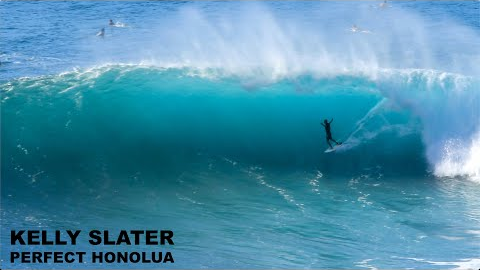KELLY SLATER HONOLUA BAY ON FIRE !!! (BEST RAW)
321,346 View
Share this Video
- Publish Date:
- September 29, 2025
- Category:
- Surfing
- Video License
- Standard License
- Imported From:
- Youtube
Tags

"HONOLUA BAY WITH KELLY SLATER" (BEST RAW)
In 2016 Kelly Slater came to Honolua Bay, on Maui during a powerful large north west swell that peaked later in the day right before sunset, the crowd was small with very few experienced surfers out and lots of perfect waves coming in before the day ended.
Watching Kelly Slater surf Honolua Bay for the first time on a good day was incredible and a dream come true as he has been one of my biggest inspirations. The lines he was drawing were so mesmerizing and he was surfing Honolua Bay like he has surfed it his whole life.
Filming this was so much fun, screaming after every wave with stoke capturing Kelly do his thing. A great memory of the greatest surfer of all time, to share with you all. SUBSCRIBE for more action as a new winter season is headed our way.
This content is from January 2016
I hope you enjoy this edit !
Subscribe to the channel like and comment on the videos or
Share the channel if you like what you see.
All content shot in HD 1080p, Enjoy the action and Aloha Nui ! Paradise It !
Filmed & Edited by MROD MAUI © : IG https://www.instagram.com/mrod_maui/
For all content inquiries contact here: [email protected]
-----------------------------------
Exploring Water Temperature Trends: Seasonal Variations, Ocean Warming, and the Future of Marine Ecosystems
Water temperature trends are a critical indicator of our planet's health. As we navigate the complexities of climate change, understanding how water temperatures fluctuate and affect marine life becomes increasingly important. This article delves into the seasonal variations, ocean warming, and the future of marine ecosystems, providing actionable insights and valuable information on this pressing issue.
Climate Change: The Driving Force Behind Changing Water Temperatures
Climate change is at the forefront of altering water temperature trends globally. Rising global temperatures lead to warmer oceans, which in turn affect weather patterns, sea levels, and marine biodiversity. The connection between atmospheric temperatures and oceanic changes is undeniable, and addressing climate change is essential for mitigating its impact on water temperatures.
Ocean Warming: Impacts on Marine Life and Ecosystems
Ocean warming poses significant threats to marine ecosystems. Increased temperatures can lead to coral bleaching, disrupt fish migration patterns, and reduce oxygen levels in the water. These changes not only harm marine species but also affect human communities that rely on the ocean for food, recreation, and economic activities. Understanding ocean warming is crucial for developing strategies to protect and preserve marine life.
Seasonal Variations: Understanding the Natural Fluctuations
Seasonal variations play a significant role in water temperature trends. Different seasons bring about changes in sunlight, precipitation, and wind patterns, all of which influence water temperatures. For example, summer months typically see higher sea surface temperatures, while winter brings cooler waters. Recognizing these natural fluctuations helps differentiate between regular seasonal changes and long-term trends caused by climate change.
Thermal Pollution: Human Activities Altering Water Temperatures
Thermal pollution, often resulting from industrial processes and urban runoff, introduces excess heat into water bodies. This artificial heating can disrupt local ecosystems, harming aquatic life and altering natural temperature patterns. By minimizing thermal pollution through better regulation and sustainable practices, we can help maintain healthier water temperatures and protect marine environments.
The Hydrological Cycle: Its Role in Modulating Water Temperatures
The hydrological cycle is a fundamental process that influences water temperatures. Evaporation, condensation, and precipitation work together to distribute heat energy across the globe. Changes in the hydrological cycle, driven by climate change, can alter water temperatures in both freshwater and marine systems. Understanding this cycle is essential for predicting and managing future temperature trends.
Marine Ecosystems: Adapting to Changing Water Temperatures
Marine ecosystems are highly sensitive to changes in water temperatures. As temperatures rise, species must adapt, migrate, or face the risk of extinction. Coral reefs, often referred to as the "rainforests of the sea," are particularly vulnerable to warming waters. Protecting these ecosystems requires comprehensive strategies that address both the causes and effects of changing water temperatures.
Future Outlook: Navigating the Challenges Ahead
Looking ahead, the future of marine ecosystems hinges on our ability to address water temperature trends effectively. Implementing sustainable practices, reducing greenhouse gas emissions, and investing in research are critical steps toward mitigating the adverse effects of climate change on water temperatures. By staying informed and proactive, we can work towards a more resilient and thriving marine environment.
In conclusion, water temperature trends offer valuable insights into the health of our planet. By understanding the interplay between climate change, ocean warming, seasonal variations, thermal pollution, the hydrological cycle, and marine ecosystems, we can develop informed strategies to protect and sustain our marine environments for future generations.














